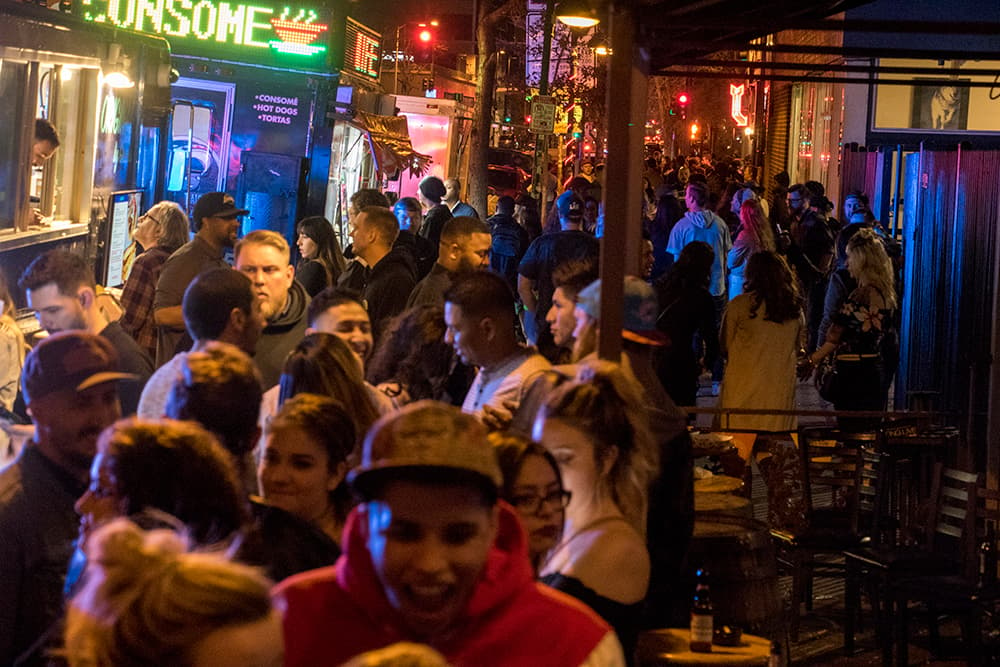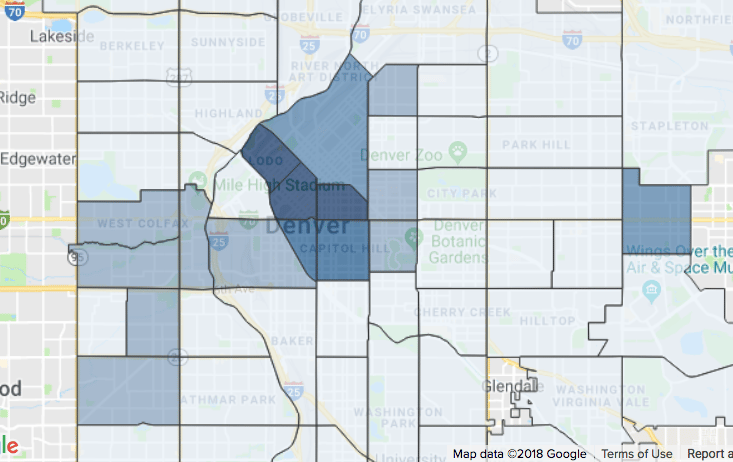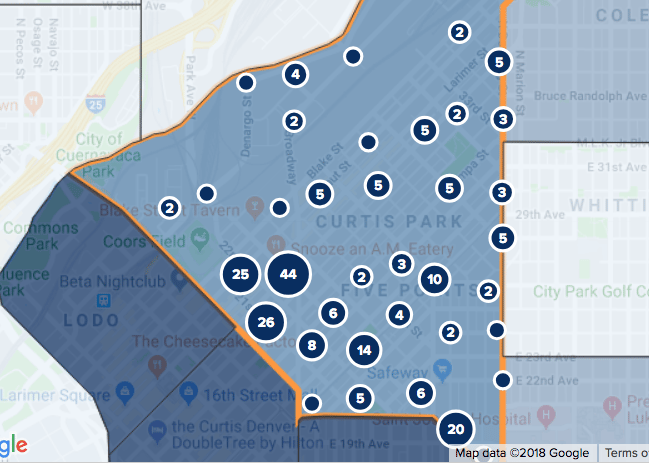
A Friday night had only just turned into an early Saturday morning last weekend when something strange and violent happened on Denver's popular nightlife scene.
That’s not especially remarkable for the epicenter of partying in Denver -- the LoDo and Ballpark districts.
But what happened at 12:45 a.m. at Mile High Spirits is probably a once-in-a-lifetime thing. FBI agent Chase Bishop was dancing in a space cleared by the crowd when he did a backflip, lost the gun that was in his pants, grabbed it off the ground and accidentally shot a man in the leg. All on camera.
The incident has prompted chatter around Denver — not to mention a lawsuit and an offer of free drinks for life. On social media and in real life, people are asking how someone was able to enter a bar with a weapon. They want to know what the bars in the notoriously rowdy neighborhood are doing to prevent violence and why those bars continue to operate when Cold Crush, a Larimer Street hip-hop bar, was shut down.
As a nightlife destination, the area has a reputation for rowdiness — and not always the fun kind.
Paula Grey, who formerly worked with the LoDo Neighborhood Association's Good Neighbor Committee and the LoDo District's Hospitality Committee, now does what she calls grassroots volunteering, sometimes acting a liaison between the bars and the city. She's also a LoDo resident, and she's frustrated by the state of things.
"It’s hard. It’s bad down there. And I feel bad -- there are some good operators," she said when we spoke a few months ago about bar closing times. She's among the number of people who say that allowing bars to stay open later, allowing for staggered closing times and a slower let-out of drunk customers, would settle things down.
"I think this is kind of out of the box," she said of the Mile High Spirits incident when we spoke again this week. "It was an FBI agent. Whether it was legit that he had that firearm on him or not... I can tell you the bar manager, she was really upset and said, 'I don’t know what we’re going to do.' And that particular bar is a very friendly bar. It’s in a bad neighborhood, but it’s very well run."
To put some facts behind the area's reputation, we went digging in crime stats. Upon request, the Department of Public Safety provided Denverite with its list of “calls for service” to five bars there over the last year. One is Mile High Spirits, and the others — ViewHouse, Beta Nightclub, The Ginn Mill and Lodo’s Bar & Grill — were chosen as large, popular bars in the heart of the scene
A Denverite analysis of crime stats at the five bars showed Mile High Spirits didn't stand out. We tallied the number of calls for things like assault, harassment, weapons possession and fighting, excluding things like noise complaints, silent alarms, welfare checks and “subject stops.”
After removing calls for service that simply indicate an officer is working off duty, we found the bars had anywhere from 65 to 201 calls to the police from June 3, 2017, to June 3, 2018. Mile High Spirits had 175 — the second highest behind ViewHouse — and the Ginn Mill was not far behind with 136. Mile High had two calls marked "weapon/concealed weapon," ViewHouse had three, Ginn Mill had five, Lodo's had one and Beta had none. Assault was the most common call — 14 for Mile High, 20 for ViewHouse, 18 for Ginn Mill, 10 for Lodo's and four for Beta — and calls for an intoxicated person were a close second.
Mile High Spirits' only big distinction was an usually high number of calls marked "self-initiated action," which a representative for the Department of Public Safety confirmed means an officer on the scene contacted someone or took some other form of action. (You can see more of the stats below.)
It’s important to note a couple of things here. 1. These are calls to the police, which means that a responding officer did not necessarily find that a crime had been committed. A call for “shots heard/fired,” for example, does not mean shots were definitely fired. 2. The frequency with which the police are called can depend on the bar and its patrons. So, again, the number of calls might not be equal to the number of incidents.
For this story and another involving crime and general rowdiness in LoDo, the Denver Police Department has declined to comment on the state of things in the neighborhood — instead directing us to their Denver crime map.
The Department of Public Safety does not have data on how many of the calls turn out to be nothing.
The police department’s crime map can’t provide data specific to bars, but it does offer hard numbers on actual crimes committed. The map breaks it down by neighborhood, and LoDo and Ballpark are mainly in the neighborhoods of Union Station and Five Points. Though much of LoDo is technically in Five Points according to city boundaries, it makes up only a small portion of the neighborhood.
From June 3, 2017, to June 3, 2018, there were 121 violent crimes (murder, robbery, aggravated assault) in the Union Station neighborhood for a crime density of 275.63 offenses per square mile. In Five Points, there were 237 violent crimes, or 134.81 per square mile. Those numbers were among the worst in the city, along with the Central Business District, Capitol Hill and North Capitol Hill.

Breaking that down by crime, time and place gets pretty deep in the weeds, but here’s a glance.
In the Union Station neighborhood, there were 30 robberies and 90 aggravated assaults in that time period. Six of those assaults were domestic violence, the rest were classified as “assault causing serious bodily injury.” Assault causing minor bodily injury is in its own category, with more than 110 entries. There was one murder at 12:25 a.m. July 31, 2017, on the 1500 block of Wynkoop Street.
Also in that time period there were six incidents of someone caught carrying a concealed weapon and five of someone with a prohibited weapon. There were 13 cases of public fighting two of someone “flourishing a weapon at another person,” two of possession of a weapon, two of possession of an illegal/dangerous weapon, three classified as “weapon - other” and three of unlawful discharge of a weapon.
In the much larger Five Points neighborhood, there were five murders, 299 cases of assault causing minor bodily injury and 97 cases of assault causing serious bodily injury, 25 of which were domestic violence. There were also 65 robberies, four incidents of a weapon fired in an occupied building and three in an occupied vehicle.
You can see on the map that most of the crime categorized as violent in Five Points is happening in the LoDo area, clustered southwest of Park Avenue

Sexual assaults don’t show up on the map, though we were able to pull out some numbers for 2018. There were 15 sexual assaults across Union Station and Five Points. Nine were classified as rape.
It's a known problem, but no one can agree on a solution.
"When you let out hundreds of thousands of people at 2 a.m., that’s what’s going to happen," City Council President Albus Brooks, who represents LoDo and Ballpark's District 9, said of the atmosphere.
The bar owners and managers, of course, talk about the crime problem. Grey said most ideas, like getting metal detectors, are scrapped because they're too expensive.
"We talked about — and I can’t remember the name of it — but there’s a system that the bars could all sign up for where they scan drivers licenses or whatever and if there’s a problem it gets sent to the other bars, but only the bars that have the money were willing to do it."
Efforts to change the law and allow bars to stay open later, reducing the chaos that comes with the mass let-out at 2 a.m., have been unsuccessful. The current law prohibits alcohol sales between 2 and 7 a.m.
Brooks said the community needs to have a real conversation about staggered and later bar closing times, and acknowledged that "it's very controversial." But what he's seen in other communities is that violence rates can be lowered that way — and what he's seen in Denver is that we have a problem.
"I’ve gone on police ride-arounds at 2 o'clock and it’s an overwhelming experience," he said, "and to be quite honest, I can’t believe we don’t have more violence at that time."
The most recent initiative to change closing time was in 2017, when Sen. Vicki Marble, Rep. Dan Thurlow and since-expelled Rep. Steve Lebsock sponsored a bipartisan bill that would allow “a local government to extend the hours during which alcohol beverages may be sold for on-premises consumption at establishments within the local governments jurisdiction.” The bill passed a Democrat-controlled House but died in the Republican-led Senate because of concerns that different closing times in different cities would encourage people to drive drunk in search of one more drink.
Grey was also part of an effort to change the liquor law back in 2014. She worked with Denver Rep. Crisanta Duran on a bill that also would have let towns and cities choose their closing times.
“In larger cities where they have bars that are open later through the night people naturally leave and you don’t have hundreds of people on the street at a time,” Duran told CBS4 at the time.
"...We’re just trying to give local governments another tool to work with to combat violence issues."
Now, Grey thinks it should be a statewide change that would allow closing time decisions to be made by each individual bar. The problem is that Denver has bigger problems.
"There are a lot of issues we’re dealing with right now," Brooks said. "...Right now we’re focused on housing and transportation issues. But it moves to the forefront when a big event happens like this."
More on the calls for service:
Mile High Spirits
Total calls: 175
Shots Heard / Fired: 2
Weapon/Concealed Weapon: 2
Assault: 14
Sex Assault: 1
Domestic Violence: 0
Fight: 3
Threats: 7
Indecent Exposure: 2
Harassment: 2
Theft: 8
Robbery: 0
Narcotics: 22
Intoxicated Person: 12
Detox: 0
Overdose/Poisoning: 2
Criminal Mischief: 5
Disturbance: 6
Self-Initiated Action: 11
ViewHouse
Total calls: 201
Shots Heard/Fired: 0
Weapon/Concealed Weapon: 3
Assault: 20
Sex Assault: 1
Domestic Violence: 0
Fight: 2
Threats: 2
Indecent Exposure: 1
Harassment: 2
Theft: 10
Robbery: 1
Narcotics: 1
Intoxicated Person: 14
Detox: 1
Overdose/Poisoning: 1
Criminal Mischief: 1
Disturbance: 26
Self-Initiated Action: 0
The Ginn Mill
Total calls: 136
Shots Heard/Fired: 0
Weapon/Concealed Weapon: 5
Assault: 18
Sex Assault: 0
Domestic Violence: 0
Fight: 9
Threats: 0
Indecent Exposure: 0
Harassment: 0
Theft: 13
Robbery: 0
Narcotics: 0
Intoxicated Person: 10
Detox: 4
Overdose/Poisoning: 2
Criminal Mischief: 1
Disturbance: 0
Self-Initiated Action: 0
Lodo’s Bar & Grill
Total calls: 94
Shots Heard/Fired: 0
Weapon/Concealed Weapon: 1
Assault: 10
Sex Assault: 1
Domestic Violence: 0
Fight: 2
Threats: 2
Indecent Exposure: 0
Harassment: 0
Theft: 6
Robbery: 0
Narcotics: 1
Intoxicated Person: 9
Detox: 1
Overdose/Poisoning: 0
Criminal Mischief: 3
Disturbance: 6
Self-Initiated Action: 2
Beta Nightclub
Total calls: 65
Shots Heard / Fired: 0
Weapon/Concealed Weapon: 0
Assault: 4
Sex Assault: 1
Domestic Violence: 1
Fight: 1
Threats: 0
Indecent Exposure: 0
Harassment: 1
Theft: 0
Robbery: 0
Narcotics: 0
Intoxicated Person: 5
Detox: 2
Overdose/Poisoning: 1
Criminal Mischief: 0
Disturbance: 6
Self-Initiated Action: 0
(Note: These stats didn’t appear to include an incident this February in which a security guard punched a patron.)













